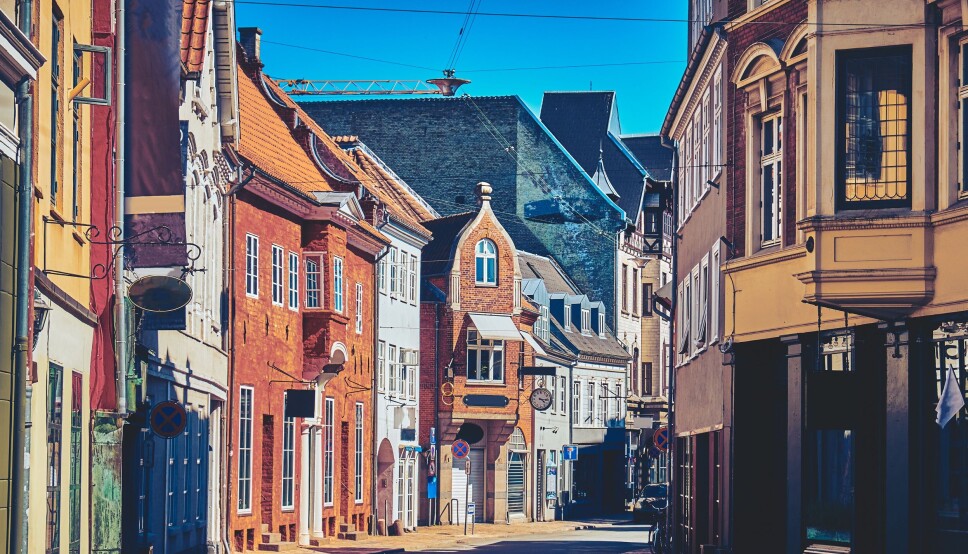Researchers' Zone:

Researcher: Denmark's world-record level of trust is helping us in the fight against corona
COMMENT: The vast majority of Danes are showing 'community spirit'. This is due, fundamentally, to the fact that we trust each other and the authorities.
What role does trust play in times of crisis?
An important factor in understanding how it has been possible for Denmark to deal with the current corona crisis as it has done may be precisely the presence of trust.
Countries with a high level of trust may be better equipped to tackle the corona crisis than those with low levels.
It is striking that we in Denmark do not see a host of conspiracy theories and widespread panic spreading in the handling of the corona crisis.
Conversely, one can envisage that countries with relatively lower levels of trust will find it harder to deal with the problem. For example, curfews have been imposed in Italy, France and Spain.
If you have low levels of trust regarding other people or the authorities, then more draconian laws are potentially required to contain the corona virus.
The suggestion here is, therefore, that the relatively calm Danish waters are due to our 'X-factor' in terms of our general trust in other people (social trust) as well as our trust in the authorities’ absence of corruption.
This unique cache of trust provides us with the best possible hand when it comes to riding out the corona crisis.
Denmark is world champion in trust
Social trust increases the ability for voluntary cooperation without people being forced by a third party, such as the state.
We can use social trust as the standard measure for this ability to cooperate because it expresses how people assess the risk of being cheated by others in a society.
Social trust is measured as the percentage of a population that answers yes to the question: ‘in general, do you think most people can be trusted or can’t you be too careful?’
Data relative to comparable European countries can be obtained from the European Social Survey, which has ranked 36 European countries on a scale of 0-10.
0 is, ‘you cannot be too careful," and 10 is, ‘most other people can be trusted’.
Taking the average for all the surveys in the period 2002-2018, Denmark comes out on top with a score of 6.92, followed by the other Nordic countries, i.e., Norway (6.69), Finland (6.61), Iceland (6.26) and Sweden (6.20).
Do good institutions provide high levels of trust?
A key result is, therefore, that the five Nordic countries stand out as high-trust countries with much more social trust than the rest of Europe (and the whole world).
For example, if we look at countries with relatively lower levels of trust, where more social unrest can be expected in dealing with the corona crisis, we can find some of the countries that have already imposed curfews: Italy (4.63), France (4.50) and Spain (4.98).
The likelihood that we will also be put under a curfew or that similarly drastic measures will be taken out in Denmark is significantly lower. This is simply because we trust and comply with the recommendations of the authorities – unlike what is happening in Italy, France and Spain.
Whether or not one country imposes a curfew depends not only on the degree of trust but also on how bad the corona situation is in each country; the extent of the infection and number of fatalities could 'overrule' trust, should the situation require it.
The point is simply that it is easier for the authorities in a high-trust country to get the population to listen voluntarily and abide by advice and guidance rather than through outright injunctions, which require a lot of the state’s resources to enforce.
And this makes it easier to contain corona before curfews and coercion are needed.
So, what explains the difference in whether or not you trust your country's authorities?
One explanation for the great variation in social trust across European countries could be the quality of the institutions.
Denmark and the other Nordic countries have the lowest levels of corruption in the world, which promotes trust in the institutions.
High trust = low corruption - and vice versa
The latest ‘2019 Corruption Perception Index' from Transparency International ranks 180 countries on a scale of 0-10 according to how corrupt experts and businessmen rate the public sector to be. 0 corresponds to total corruption, and 10 to no corruption.
If we take the same countries as before on social trust, Denmark ranks number 1 again (8.7), while the other Nordic countries follow closely, namely Finland (8.6), Norway (8.4), Sweden (8.5) and Iceland (7.8).
High-trust countries also have low levels of corruption.
Countries with relatively lower levels of trust, on the other hand, have higher levels of corruption, with the following scores: Italy (5.3), Spain (6.2) and France (6.9). So, this shows the same pattern as social trust above.
The absence of corruption means that people can, for example, trust that tax payments are not stolen by corrupt bureaucrats and politicians but rather invested for the good of society in collective benefits for the state, such as the effective fight against the corona virus.
Trust saves money on control measures
Incorrupt countries provide citizens with good value for their money, whereas taxpayers' money often 'disappears' and 'goes into the wrong pockets' in corrupt countries – to the great detriment of trust in the institutions.
In other words, well-functioning institutions reduce the likelihood of citizens being cheated. Generally speaking, it makes sense to comply with the recommendations of the authorities in Denmark, therefore, without this leading to criticism and unwanted behaviour.
In general, Denmark and the other Nordic countries have more social trust than their southern European neighbours. (Photo: Shutterstock)

The vast majority of Danes are complying with the guidelines and showing 'community spirit'. Fundamentally, this is because we trust that the state will do its best for us and act in our common interest.
Trust is, in the end, good business. When trust is high, the state can save resources when it comes to control. For example, a lot of resources do not have to be used to force people into changing their behaviour, because they do it by themselves.
It’s about competitiveness too
Moreover, it is surprising here that the public administration in Denmark has, over the past few decades, introduced increasingly more controls through extremely complex and time-consuming demands for documenting work tasks.
For example, it has been suggested that successive controls over the unemployed have mostly come to benefit the people who carry out the checks.
Controls cost money, whereas trust is cheaper when one's fellow citizens and the authorities are trustworthy.
So, it is a question of competitiveness too, and how we optimise the use of resources in Danish society.
Resources saved in control measures can instead be put to use in the fight against the corona infection, in research into vaccines, in funding aid packages for business and so on.
EU must ensure that all Member States tackle coronavirus – also when it comes to finance
But it is not enough for Denmark alone to take the lead in the fight against the corona virus. The EU will also have an important role to play, ensuring that from now on all countries contribute to tackling the problem fairly – including countries with low levels of trust and high levels of corruption.
Initiatives are expensive, which is why it may be very tempting for individual Member States to freeride in the future.
This is a problem of collective action where the bill can be ‘passed on' to the other members to pay for the joint European effort at the same time as reaping the rewards of their work – and doing so for free.
So, when the EU has to intervene to solve this problem of collective action, it is important that all Member States contribute to financing it.
Such clear agreements on sharing the financial burden in the EU are – moving forward – important to get in place in time, when the corona virus is to be defeated over time. This will be a big challenge as the bill will be huge!
Otherwise, some may end up abiding by the ethos, as the jazz pianist Leo Mathisen ('The Lion') sings in his excellent swing number 'Take it Easy', 'Let the others do the hard work for you!'
EU must coordinate a joint European effort
In order to tackle the free-rider problem of internal EU coordination and joint European action against the corona virus, the Commission must take the lead.
Here it is important to coordinate the efforts of each country and to get everyone onboard, so that, in the end, there is enough money in the coffers to finance an effective policy in this area. This is no different to when the EU has to deal with the climate crisis or refugee flows in the pan-European region.
Similarly, the European External Action Service (EEAS) can become a key player. The EEAS can also disseminate knowledge on how best to deal with the corona crisis.
If, for example, Denmark finds the best solution in a particular area, this 'best practice model' could be scaled up and offered to the other EU countries as well as the world as a whole.
Danes are good at ‘holding their horses’
While a few people may be hoarding in Denmark, people are not panicking.
There is still plenty of yeast and toilet paper. You are still met by the wry Danish smile, and people generally think 'everything is going to work out okay'. It usually does.
As the Queen put it in her historic corona virus address to the nation, March 17, we will show unity again, as we have done so often before.
Here we are well-equipped with the double Danish world record in social trust and absence of corruption respectively.
With this foundation, we will be able to take the lead in Europe and help ensure effective action for the common good.
The vast majority of Danes are taking this calmly – they are 'holding their horses' safe in the knowledge that everything is under control.
However, it may be better to find another animal to pet in the near future as corona virus has also been found in horses.
Thank you to Knud Erik Jørgensen, Kim Mannemar Sønderskov and Gunnar L.H. Svendsen for constructive comments.
Translated by Stuart Pethick.
Read this article in Danish at our Danish sister site Forskerzonen.
References:
Gert Tinggaards profil (AU)
EEAS (2020). European External Action Service
'The meaning of social capital and its link to collective action', i bogen 'Handbook of Social Capital - the Troika of Sociology, Political Science and Economics', Edward Elgar Publishing Ltd (2016)
'Elinor Ostrom', Djøf Forlaget (2019)
'Do Corruption and Social Trust affect Economic Growth? A Review', Journal of Comparative Policy Analysis: Research and Practice (2014), DOI: 10.1080/13876988.2012.741442
'Mancur Olson', Djøf / Jurist- og Økonomforbundet (2012)
'Trust', Aarhus University Press (2018)
'Trust, Social Capital and the Scandinavian Welfare State: Explaining the Flight of the Bumblebee', Edward Elgar Publishing Ltd (2016)
Transparency International: Corruption Perceptions Index 2019








